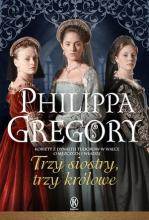
Three Sisters, Three Queens
Trzy siostry, trzy królowe
Born in Kenya in 1954, Philippa Gregory moved to England with her family and was educated in Bristol and at the National Council for the Training of Journalists course in Cardiff. She worked as a senior reporter on the Portsmouth News, and as a journalist and producer for BBC radio. Philippa obtained a BA degree in history at the University of Sussex in Brighton and a PhD at Edinburgh University in 18th-century literature. Her first novel, Wideacre, was written as she completed her PhD and became an instant world wide bestseller. On its publication, she became a full-time writer, and now lives with her family on a small farm in the North of England. Her knowledge of gothic 18th century novels led to Philippa writing ,em>Wideacre, which was followed by a haunting sequel, The Favoured Child, and the delightful happy ending of the trilogy: Meridon. This novel was listed in Feminist Book Fortnight and for the Romantic Novel of the Year at the same time - one of the many instances of Philippa's work appealing to very different readers. The trilogy was followed by The Wise Woman, a dazzling, disturbing novel of dark powers and desires set against the rich tapestry of the Reformation, and by Fallen Skies, an evocative realistic story set after the First World War. Her novel A Respectable Trade took her back to the 18th century where her knowledge of the slave trade and her home town of Bristol produced a haunting novel of slave trading and its terrible human cost. This is the only modern novel to explore the tragedies of slavery in England itself, and features a group of kidnapped African people trying to find their freedom in the elegant houses of 18th century Clifton. Gregory adapted her book for a highly acclaimed BBC television production which won the prize for drama from the Commission for Racial Equality and was shortlisted for a BAFTA for the screenplay. Next came two of Gregory's best-loved novels, Earthly Joys and Virgin Earth, based on the true-life story of father and son John Tradescant working in the upheaval of the English Civil War. In these works Gregory pioneered the genre which has become her own: fictional biography, the true story of a real person brought to life with painstaking research and passionate verve. The flowering of this new style was undoubtedly The Other Boleyn Girl, a runaway best-seller which stormed the US market and then went worldwide telling the story of the little-known sister to Anne Boleyn. Now published in 26 countries with more than a million copies in print in the US alone, this is becoming a classic historical novel, winning the Parker Pen Novel of the Year award 2002, and the Romantic Times fictional biography award. The Other Boleyn Girl was adapted for the BBC as a single television drama and a film starring Scarlett Johansson as Mary Boleyn, Natalie Portman as Anne Boleyn and Eric Bana as Henry VIII. Six Tudor novels later, she is looking at the family that preceded the Tudors: the magnificent Plantagenets, a family of complex rivalries, loves, and hatreds.
She lives in Yorkshire in the North of England with her husband and two children and in addition to interests that include riding, walking, skiing and gardening (an interest born from research into the Tradescant family for her novel, Virgin Earth), she also runs a small charity building wells in school gardens in The Gambia.
As sisters they share an everlasting bond; as queens they can break each other’s hearts.
When Katherine of Aragon is brought to the Tudor court as a young bride, the oldest princess, Margaret, takes her measure. With one look, each knows the other for a rival, an ally, a pawn, destined—with Margaret’s younger sister Mary—to a sisterhood unique in all the world. The three sisters will become the queens of England, Scotland, and France. United by family loyalties and affections, the three queens find themselves set against each other. Katherine commands an army against Margaret and kills her husband James IV of Scotland. But Margaret’s boy becomes heir to the Tudor throne when Katherine loses her son. Mary steals the widowed Margaret’s proposed husband, but when Mary is widowed it is her secret marriage for love that is the envy of the others. As they experience betrayals, dangers, loss, and passion, the three sisters find that the only constant in their perilous lives is their special bond, more powerful than any man, even a king.